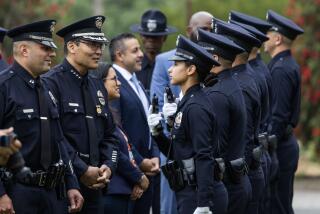Police React More Slowly
- Share via
The amount of time it takes Los Angeles police officers to respond to emergency calls has been creeping steadily upward over the last three years and now averages more than 10 minutes citywide, despite an increase in the overall size of the force, officials said Monday.
The trend was revealed in a report to a City Council committee on the LAPD’s work schedule, which allows officers to work three 12-hour days each week. Council members were alarmed by the report, and some expressed concern that the new schedule might mean fewer officers would be available to respond to emergency calls.
“A 10-minute response time is not acceptable,” said Councilman Dennis Zine, a former police officer. “It’s getting longer and longer.”
But Zine said he did not think the so-called compressed work schedule, which has been in place since the end of 2001, was to blame. He agreed with officials who said that further analysis is necessary to know the effects on response time, which has been rising slowly but steadily over the last three years.
In 2000, the average time from the moment a dispatcher sent out a call to the time officers arrived was 7.7 minutes. By 2002, it was taking 9.6 minutes and, so far this year, the average is 10.5 minutes, department officials said.
“The question is why,” said Councilman Jack Weiss, who called for the department to prepare a more detailed analysis of factors that could be affecting response times.
Police officials said the longer response time is a big concern, but should not be taken as a sign that the department is not doing its job.
“Our No. 1 goal is to reduce crime,” said Cmdr. Robert Hansohn, the head of the LAPD’s personnel group. “Crime is down.”
Homicides have declined 23.5% from January to June of this year when compared with the same period last year, and the department has made 9.2% more arrests, officials said.
Mayor James K. Hahn agreed that response times are not the only measure of effective policing. “Obviously, if you’re making an arrest, you’re not available for radio calls,” he said.
Chief William Bratton “isn’t someone who ever put response time at the top of his list,” the mayor said.
Hansohn said there could be many reasons for the longer lag time, among them the increased demands on officers’ time since Sept. 11 and the unavailability for radio calls of the increasing number of officers assigned to specialized duties, such as gang enforcement. He said the 9,200-officer force would have to grow by at least 600 to get response time down to seven minutes.
Still, Mary Grady, the public information director for the Police Department, said top officials have been meeting in recent weeks to come up with creative ways to get police cars rolling more quickly in response to calls. “The brainstorming has begun,” she said.
Gordon Lawler, a city analyst, said officials would discuss the issue with the department and the police union this year. He added that there were no firm plans to change the schedule.
But some on the council, such as departing Councilman Nate Holden and Councilman Bernard C. Parks, the former police chief, said they have an easy answer: Get rid of the three-day workweek.
“It’s very clear what the dilemma is,” said Parks, who expressed concerns about the three-day work schedule before it was implemented during his tenure.
“When you take the number of police cars off the street on a daily basis, it’s impossible to believe that you’re going to have the same coverage and the same response time.”
*
Times staff writer Matea Gold contributed to this report.
More to Read
Sign up for Essential California
The most important California stories and recommendations in your inbox every morning.
You may occasionally receive promotional content from the Los Angeles Times.













